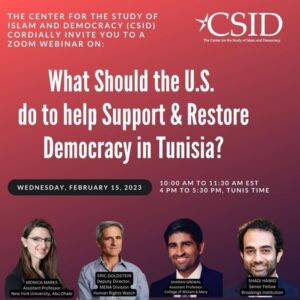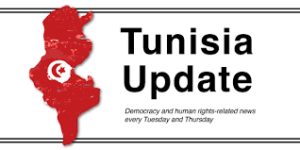The move is part of President Kais Saied’s campaign to eliminate free political expression and suppress democracy in Tunisia. It was followed by shuttering the headquarters of Ghannouchi’s party, Ennahda, and of the umbrella organization opposing Saied, called the Salvation Front.
 “This is the final nail in the coffin of Tunisian democracy,” said Radwan Masmoudi of the Center for the Study of Islam and Democracy (CSID), who has served as an advisor to Ghannouchi on U.S.-Tunisia relations.
“This is the final nail in the coffin of Tunisian democracy,” said Radwan Masmoudi of the Center for the Study of Islam and Democracy (CSID), who has served as an advisor to Ghannouchi on U.S.-Tunisia relations.
Saied’s Tunisia seems a stepchild of the bad old order, the latest iteration of what Nadim Houry, executive director of the Paris-based Arab Reform Initiative, described as an “authoritarian restoration” that got underway in the years after the Arab Spring. Saied is pushing through a “striking process of detransition” from democracy, Houry tells The Post’s Ishaan Tharoor.
Tunisia is the only country which overthrew an authoritarian ruler during the 2011 Arab Spring and went on to build a democracy. However, the raiding of the headquarters of the opposition Ennadha party and arrest of its leader indicates that the country is being taken back to an illiberal form of rule, the BBC reports:
The incoming “transitional government” allowed new political parties, and free speech. Several elections were held, in which the moderate Islamist party Ennahda (Rennaisance) gained the most parliamentary seats but never won a majority. It had to share power with secular parties.
“After the revolution a new consensus emerged, in which the Islamist party and the secular ones agreed to work together to create new democratic institutions,” says Riccardo Fabiani of the International Crisis Group.

Credit: POMED
But the politicians failed to agree on how to set up a constitutional court, says Melek Saral of SOAS, University of London. “The court was needed to provide checks and balances on the government, and to guarantee human rights…. Not getting an agreement on the constitutional court was one of the main failures when setting up the democratic system.”
As Tunisia’s crisis worsens, Saied lost the trust of international institutions, adds Saoussen Ben Cheikh. His actions isolated him from Western allies who disapprove of his sabotage of the transition. To save his country from financial bankruptcy, Saied sought alternative backers in the Gulf region (UAE, Saudi Arabia). However, the US has asked these countries to hold back their support, she writes for Global Voices:
As a result, Saied turned to Algeria, which has also engaged in a similar repressive takeover. Algeria has become indispensable to Tunisia’s survival, and the list of favors is long. In February 2020, Algeria made a deposit of USD 150 million to the Tunisian Central Bank. It generously granted a USD 300m loan to “support the struggling Tunisian economy” in 2021, and an additional USD 200M in 2022. Algeria also sells fuel and gas to Tunisia at preferential prices.
#Tunisia is reviving the pre-revolution autocratic order with #Algeria‘s assistance, undermining democracy, @CheikhSaoussen writes for @globalvoices https://t.co/egQZ15cgOe
— Democracy Digest (@demdigest) April 20, 2023
President Saied has never wavered from his favorite themes: the fight against the enemies of the community (umma), whom the holy scriptures refer to as “hypocrites,” and the pursuit of speculators, because transactions based on financial interest are forbidden in Islam, analyst Pierre Boussel writes for GIS Reports:
As for elections, he does not hesitate to publish results, however weak they may be, as long as they can demonstrate that Tunisians “no longer trust this institution.” For him, democracy is an imported model that has no place in the country.
While the West was alarmed by the disastrous turnout of just 11.4 percent in the last parliamentary elections, the Tunisian president was delighted that a vast majority of voters stayed away from the ballot box.
Democratic Backsliding & Threats to Democracy in the Arab World – Thursday, June 1 · 12:00 – 1:30 PM – Keynote Luncheon Speakers:@DamonMacWilson @NEDemocracy @AmaneyJamal @PrincetonSPIAA. Moderator: @radwan_masmoudi @CSID_DC https://t.co/NiZtDTcp48
— Democracy Digest (@demdigest) April 20, 2023







